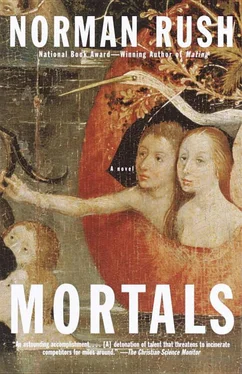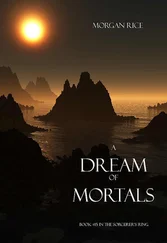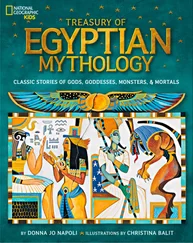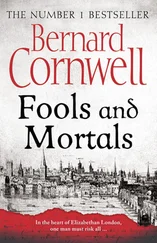“Just a minute, Davis , aren’t we the same generation, the two of us? How old are you?”
“Just forty-six.”
“And I was just forty-nine.”
“So you think I should have said our generation?”
“Don’t you?”
“Okay. But Iris I put into the next generation down. She’s thirty-six. At thirty-six.”
Ray had to bite his tongue. It was a shock because if she had given thirty-six as her age it meant she had been willing to lie and the lie was a sign that she had wanted Morel starting as far back as filling in the date of birth on the medical history form, on her first visit. He couldn’t believe it. This was so far beyond unlike her that he couldn’t believe it had happened. Could Morel be misremembering? That had to be the answer.
“Finish your thought,” Ray said.
“That’s about it. What I proposed is that Paradise Lost addresses all your ambivalence about what you’re doing with your life. And the ambivalence gets more acute as your side wins. You feel it winning before it finally happens. You have the victory, not like Milton, who had to see the kings come roaring back into London. So I think Paradise Lost tells you not to abandon an imperfect instrument, the agency, just because most of your peers say you should, just the way Paradise Lost told Milton not to abandon an imperfect institution like the monarchy just because the people, a lot of them, said he should. And with your enemy down and out you have the option of leaving the imperfect instrument … But it looks like you can’t.”
Let this go, Ray thought. There might be some truth in it, but there was a great deal that something so simple left out. Morel was stripping away everything in Milton that didn’t serve his thesis. For starters there was the conflation of biography and art, a quagmire. He wasn’t saying there was nothing in Morel’s construct. But showing Morel why it was inadequate was something he had no strength for.
A loud explosion occurred, closer than the last one.
Ray said, “Well, that’s interesting, isn’t it? I’ll have to think about it. I point out, though, that you generated this analysis of me not out of an interest in penetrating a fascinating truth, but out of an interest in penetrating my wife.”
Morel looked stunned. “That’s not the way it was,” he said.
Ray said, “Some other time we can talk about it. I’ll give it some thought.” He was curt. There were numerous things wrong with Morel’s thesis, not the least of which was taking a cartoon of Paradise Lost as representing the sum of Milton’s huge labors and leaving everything else out, the Areopagitica , the pamphlets on divorce …
Coldness seized him. It was the word divorce . There would have to be one, of course. There would be procedures, papers. Only an idiot wouldn’t have realized that. But it would have to be worked out even though it conflicted with his image of a quick vanishment into a new life, a quick and sharp exit. He was divorcing the agency too. It was over, all over. He was through. He wouldn’t discuss it with Morel. He couldn’t. Of course it would seem to him like a lunge or an adaptation late in the day to get Iris back by giving her what she had wanted for years, now, when it was too late. Tsk tsk goes the clock, he thought.
An explosion came, about as loud as the last one. A new flux of white smoke began feeding in.
Ray asked, “You know another thing white smoke tells you?”
“No, what?”
“It means we have a new pope.”
It was nothing, but they both laughed, a peacemaking laugh.
Iris had been his pope, or something like it. He had believed in Iris, in her goodness, her patience. There had been an early time when he had believed in the agency. But that had gone. But he had always believed in Iris and her steadfastness, the way Irish drunks believed in their saintly wives. But that wasn’t quite right. Now Morel was her pope, or she was Morel’s pope. It could go either way, in life.
He thought he was understanding things better. A god that was not only gratifying but actual fun to obey was what everybody wanted, maybe. He didn’t know. Or maybe he did know. Maybe she was looking for a god in Morel, the atheist. He had never been that for her, himself. Ah well, he thought.
Morel was disgruntled, Ray could tell. He had returned to his corner. He was muttering to himself. Ray picked up the phrase Obedience is paradise .
“We’ll talk about this another time,” Ray said.
Morel said nothing.
“It’ll be something to look forward to,” Ray said.
Ray returned to his corner and hunched down. Morel was going to be Ray’s first vignette. He had decided that. But it was important to get him right.
Morel looked glum. Iris was good at cheering people up. She could be funny. He remembered her recounting a dead serious argument among her preteenage girlfriends over whether it would be more embarrassing when the time came to disclose one’s breasts to a man or one’s genitals. The position arrived at had been that it would be less embarrassing to unveil genitals because female genitals were all more or less alike, whereas breasts differed a lot and so were more personal, and also they were on a scale of judgment that genitals weren’t, more might be expected. And it was funny when she talked about changing her raiment before they went out to eat. It was strange that he could think of so many amusing things she had said to him but virtually nothing amusing he had said to her unless you counted throwaways like his saying to her, You are like Power because you abhor a vacuum … cleaner and then he had used the phrase “multiplying like coat hangers,” but he couldn’t remember what it had been applied to. And she had laughed when he had taken to declaring horniness by saying, It’s sex o’clock. But then after he had done it a couple or three times too many she had asked him to give it a rest.
The sounds of battle were closer and louder. Voices were part of the mixture. The notion of what it would be like if he managed to get himself killed saving Morel’s life in some mayhem yet to unfold was something not to pursue. It would be an ironical gift for her. This was regression. It was ridiculous, wishing he could see her face when she found out what had happened. He was in a sundering process in his life and he had to embrace it and not end up like the British painter who kept writing letters to his first wife for nine years after her death, Stanley Spencer, an interesting painter, too. Ray had appreciated being shepherded by Iris to exhibitions in cities they’d visited. She had seen it as her responsibility. Now he would have to figure out on his own what to go and see when he was in venues where there were museums or galleries. He was going to be somewhere. He wasn’t sure where that would be. He would be consumed doing something that consumed him. That was all he knew.
Ray thought he could hear the sounds of running feet. The sound died.
A deafening, confounding blast, the worst yet, jarred them. The air was full of white dust. Something nearby had been pulverized. Dust had puffed in through the vents.
Morel stood up, coughing, brushing at himself. His hair was white with dust. He had been caught directly beneath one of the vents. Ray thought, I’m getting to see how he’ll look when they’re old.
Morel was pointing, jabbing furiously with one hand and holding a finger to his lips with the other.
Ray saw what it was. The north wall was showing real damage. A ragged crack ran upward for a foot or so from the floor near one end of the wall and curved over and ran to the proximate corner and down the crease and back to the floor, which, in that area, was sunken, canting down. Plainly it had been partially undermined. The wedge of masonry outlined by the crack was roughly the size of a duffel bag.
Читать дальше












